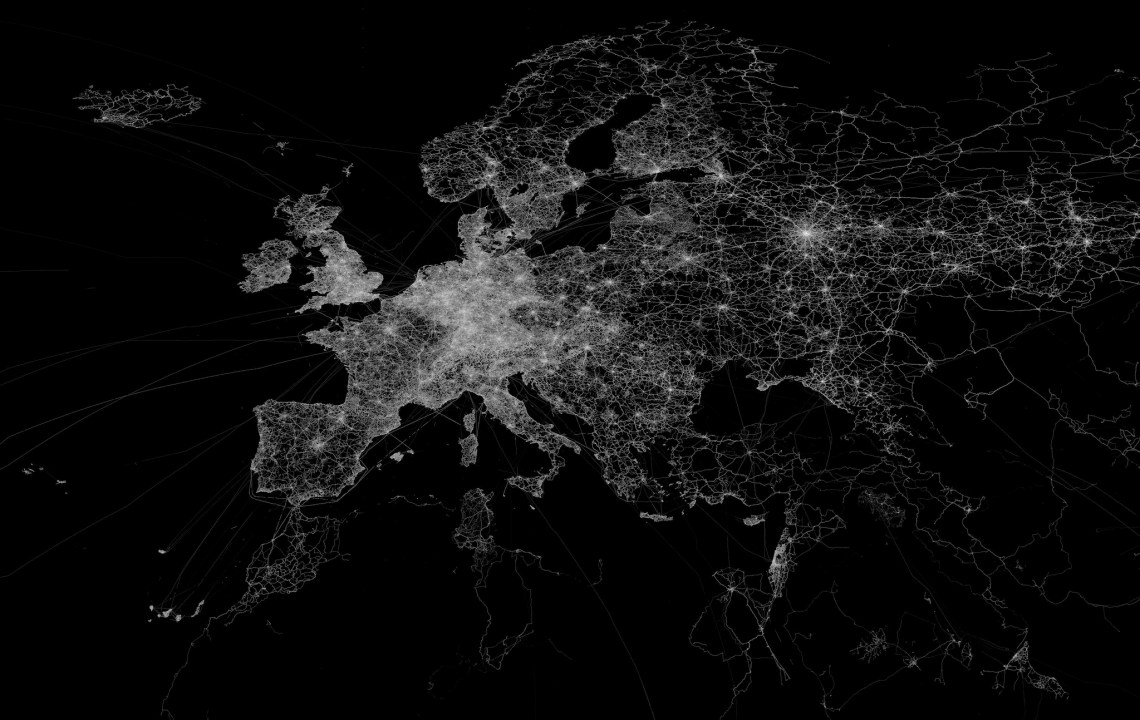
Producer’s note: Someone on Quora asked: What are good reasons that an American should not move to Europe? Here are some of the best answers that’s been pulled from the thread.
1. Alexey Karpov
1. You’ll lose a lot of “markers” and “waypoints” that made your life relatively simple and straightforward. Things won’t be as obviously, simply and universally compartmentalized into areas, neighborhoods, brands, types, grids and area codes. Things are less black and white, less contrasted, but more diverse and subtly intermingled. This goes for pretty much everything from food, to nightlife, to entertainment, to careers, to professional attitudes and everything in between.
2. You may find it troublesome to travel throughout Europe armed only with a knowledge of English. People are somewhat likely to have a negative bias towards you because of your nationality. Furthermore, it’s really more difficult for an American to truly deeply integrate themselves into a European country than it is for a European to integrate themselves into the US. Also, if you’re openly religious, you may find that many people will politely ignore your religious statements, but will consider even mild expressions such “God has blessed me with..” or “I pray that..” as unacceptably religious in a secular society.
3. Not only does a dollar usually get you further in the States, but you would find plenty of instances where there simply isn’t an opportunity for you to pay more for better/extra service/product. You may not find aspects of convenience even in places where it would seem that they should be present. Customer service isn’t all about you, it’s about the attitude of the person providing it, and whether they happen to feel that they should be doing a good job.
2. Joseph Guindi
I’ve been living in Europe for the last 7 years now, and by now I have travelled and have friends all over Europe. Honestly, I never regretted the move, best thing I ever did, but if I knew what I know now, I’m not sure I would have moved. I learned a lot of things. Here’s the list:
Every country sucks one way or another. Every single one. It’s one thing to travel there for two weeks, it’s another to wait 3 months for the Internet to get connected (Germany).
France is absolutely beautiful and the food is amazing and I love the culture, but to live there you will need to speak not just good French but near-native French (which I do speak). And when you love Paris, great, but you won’t afford to actually live in Paris, which is actually quite small and notorious for its picky landlords and tiny flats. Failing that, you join the massive cohorts of unhappy banlieusards. Oh, and the French economy has been going nowhere for several years, crisis or no crisis. A friend of mine is a professional who lived in Paris her whole life who recently moved to London and feels refreshed that London is more dynamic than France in general. Outside of Paris there are many interesting places to visit but knowledge of English dwindles quickly, even in Lyon or Toulouse.
Germany is a fantastic place to live, and it is easy to get work as long as your profession’s name starts with an E- and ends with -NGINEER. Otherwise, you’ll still need fluent (but not near-native) German. Here you get your pick of Berlin, Munich, Hamburg, Frankfurt, Cologne, each of which have their distinct personalities and IMO world-standard public transport. And here, if you find a nice flat you want to move in to, you need to apply for it because of rent control, and if it’s a nice area you’ll be one amongst a hundred prospective tenants, and for whatever reason they rarely pick the foreigners. Oh, and politically, there is a generous dose of idiotic anti-americanism and extremist Left neo stalinists in Germany.
But wait, there’s more! You know the expression “everything but the kitchen sink” ? Meaning, that someone took everything from a house, except for the kitchen sink? Well, this expression makes no sense in Germany; when you rent an apartment, you have a completely empty apartment, there are no appliance, no stove, no sink, nothing. You have two pipes sticking out of the wall awaiting your kitchen sink and the rest of your kitchen, you’ll pay 3 months deposit and you even have to pay the real estate agent’s commission of 2.4 months’ rent. Your taxes will be astronomical (just as high as in France) but instead you actually earn more money and you actually get plenty for your taxes (unlike France). The food is… an acquired taste. I love Bavarian food, the Northern food and Swabian cuisines are all unknown outside of Germany, but I like it (though it’s not French cuisine). Christmas markets are fantastic and is possibly the best thing I love about living in Germany. On the other side, you won’t find any nature in Germany. Oh, there are trees, forests, lakes and the like, but for all their environmentalism there isn’t a single spot in Germany that is truly wild where you won’t get cell phone coverage. Something which I also find lacking in Germany is a measure of American-style optimism. Customer service is possibly the best in Europe.
Switzerland is possibly the most expensive place I’ve ever seen. Much of the culture revolves around money and wealth. The positives is that you actually can live in Switzerland with only English; well, at least in Geneva and Bern. Good luck in Zürich, even Germans have a hard time understanding Swiss German. Also the Alps are never far from you, and the infrastructure is also world-class. The biggest negative is, well, I love the Swiss countryside, but I don’t really like Swiss culture, it’s not a very open place. Great place to move to when you’re a banker or diplomat aged 40+.
Point is, go first and see how you feel there. There are many negatives that you will be acquainted with once you consider actually moving there rather than when you’re just travelling. The biggest mistake I made in my first country was to generalise about Europe. France is France. Netherlands is something else. There is no such thing as “Europe” or things common to all of Europe apart from physical geography. France has great food: Dutch food is an abhorrence.
If you want to move to Europe because you think Europe is better, don’t move to Europe. It might be better in some areas, it might not be in others. What brought me to Europe was (a) love, (b) I wanted an adventure (and got it) and (c) I loved being in Germany (and it’s where I live). If you move thinking of a better life, you’re not gonna like it because every place has its flaws. It will just be different, whether you will like it will depend on whether it’s a “different” that you like.
3. Chelsea Solan
From the perspective of an American student doing a full Master’s degree in Germany:
– The University system here is much different than in the US. No one will hold your hand. There are definitely not as many organizations, sports clubs or large events to get students to known one another. The career services offices and alumni offices tend to be small, if existent at all. I know of friends who picked a grad school in the US purely based on the alumni connections they could make by going there. That would never happen here. Whereas when you first arrive to a university in the US, there is a huge orientation week where they help you step-by-step with everything about the university, that doesn’t really happen here. There were a few small orientation sessions, but no where near as extensive or helpful as one in the US might be.
– In addition to the previous, no one will hold your hand when it comes to school work either. Whereas in the US I can remember professors constantly reminding students about the readings, assigning small writings each class to know they are keeping up, and allowing for “extra credit” work, German professors generally don’t give a shit. If you don’t do the work and you fail, that’s your fault. They gave you the syllabus the first day of class, showed you where to find the readings and might remind you the week before your final paper is due, but don’t expect much beyond that. I have found that professors, at least mine, sort of take their teaching duties as a last prioriety. They are leaders in theirs fields and very knowledgable, but as such are overworked almost constantly. They don’t have the time or patience to sit with you to spell out every single thing you need to do to make sure you’re doing well in class. Read the syllabus, do the readings on time, take notes in class (most lectures aren’t mandatory) and put your all into your work and you’ll do fine.
– There are strict regulations for non-EU citizens doing full-time study in Germany (not sure about other countries). Though tuition is basically non-existent (I pay just over 200 euro a semester), you still must prove to the German government that you have enough money to sustain yourself for the entire duration of your studies. That means having a bank account with at least 14,000 euro in it for a two year study program (though these special foreign student accounts can be set up, filled with the necessary money and then you are given an “allowance” from it every month, other than that you’re not allowed to touch it except in an emergency). Additionally, if the program is in German there are generally very strict rules about language requirements. Even though I have lived in Germany for four years and have become fluent by using the language every day, I was still required to take an official exam, which set me back 200 euro. Along with all that, if you’re hoping to earn some pocket money while you work, there are regulations about exactly how much you can earn in a certain period. I believe the limit is 400 euro a month… if you factor in apartment rent and food, and the fact that the money from your foreigner account isn’t getting you very far, it might be very difficult to live in a more expensive city like Munich or Hamburg.
4. Christopher Webb
It does indeed have many positive aspects, but there is a definite downside, and you are wiser than I was to inquire about it in advance.
Bearing in mind that this is just my personal take, and someone else’s would differ, here’s what I would caution anyone contemplating such a move to consider:
The novelty wears off. All the art and architecture doesn’t mean as much after the hundredth or thousandth time, and it becomes part of the background before long. The people who grew up here can be just as blasé about it as Americans are about wide streets, spacious houses, open spaces, and big cars, and will often pepper you with questions about all the seemingly wonderful American things they’ve seen on TV and envy us for.
You might find it hard to keep up with your friends for long. It’s really a very long way away, and physical proximity is more important than you think. Social media, though, have recently helped in this regard. Maybe new expats or immigrants won’t face the same problems with this that I had in the 90’s.
You will not be the same person in a social sense. This can be good and bad. Your class, background, accent, taste, upbringing, schooling, family, etc., as they were in America, become irrelevant. Nobody cares here, or, 9 times out of 10, will even be able to tell, once you start shopping in local stores as your American clothes wear out. Instead, your identity will collapse to your nationality and only the broadest characteristics, such as age, occupation, and gender. If you have encountered discrimination on account of your background, such as having a regional or ethnic accent or having grown up in an unfashionable neighborhood, this may be a relief. If you are used to enjoying any status on account of these, you might feel put out by the sudden loss of such privilege.
Speaking of ethnicity, all of the European countries I have been to seem far more homogeneous, ethnically and culturally. Immigration is much less common or accepted, and where present on any scale, leads to poorly integrated and under-privileged enclaves. When I show class pictures to German friends and in-laws from my school days in southern California in the 1960’s and 70’s, in which my classmates were of all colors and origins, they seem truly nonplussed by just how diverse American society really is.
The language barrier is much more formidable than you anticipate. Your communication may remain frustratingly superficial for a long time, if not permanently. Even in larger cities with lots of people who have learned some English, the level is only rarely beyond intermediate at best, and you’ll mostly just be making banal small talk. This gets old fast.
It’s simply silly to say that most aspects of life are unqualifiedly better in these countries. Many are worse. Do you like the state making most decisions for you? Do you like crowds and traffic jams everywhere you go? Do you not mind working for modest pay and little chance of real material advancement? Do you not mind very long, dark, cold winters? Can you do without a car for most of your business? Will you tire of living in a small apartment, not unlikely for the rest of your days, and paying as much for it as you would for a house in most parts of America, apart from places like New York and San Francisco? Are you willing to send your kids to overcrowded, middling quality state universities, or do you want them to have a chance at the better offerings in America?
All this is not to say that it is a clear mistake to move here, but only to make you aware of the downside. On balance, I really do mostly enjoy being here, but it comes at a higher cost than I expected.
5. Tom Goodwin
I’d split this into two areas.
1. Re-adjustments.
2. Quality of life.But first two comments:
– Europe is staggeringly varied and while it’s great you’ve narrowed it down to around 5 potential nations, you are still looking at very very different places. To make this answer valid for all, I’ve had to talk only really about commonalities across most of those nations which make this a bit vague. I’d find Austria an unbearable place to live with narrow minds, cold people, terrible food, conservative values, whereas the Netherlands is the total opposite.
– Most aspects in life in Europe are not better or worse, they are different.
It’s useless to make direct comparisons, trains are way faster, cheaper and more frequent in Europe but cars are way more expensive – what does this mean? Transport is better in Europe, is it worse? It means that it’s way better for some people that it is for others, and all depending on what you value.It’s much more useful to think of aspects to life that are important to you and find ways to maximize this, rather than to look for things that are “better” or “worse”.
Anyway, to the answer.
1. Re-adjustments.
Language.
People in these nations speak English and you can likely in some roles and cities do you your job in English, but speaking passable local languages and being able to communicate with people does not mean you are fine. The reality is that you will for 10-30 years never feel at home, you won’t get to feel part of a country in the same ways that locals will. They may be warm and tolerate you but you won’t ever be one of them.Attitudes to Americans.
Quite frankly even in the Obama world, a lot of Europeans are not that warm to Americans. Sure, they won’t be hostile, they won’t be rude to your face, but a lot of Europeans are scornful of a lot of American values and this may make your time a little uncomfortable.Attitude to work.
If you are a fairly typical American, who wants to better themselves, progress, takes their job quite seriously and is competitive, you may find it hard to find a lot of people with the same level of ambition and thirst. Do they exist? Yes, but that doesn’t mean you won’t often feel a bit like you have to be mindful of expressing yourself and of acting true to your beliefs.2. Quality of life.
Salaries.
Are a LOT lower for most roles, for many, they are going to be way way less than you expect. Earning the equivalent of $100k in Europe is really rather remarkable.Taxation.
Contrary to other answers, I don’t find taxation living in the US to be that different, what tends to happen in most of these nations is that taxation above a certain threshold gets very very high, quickly. But given most roles earn less than these levels, taxation may not be as killer as you expect, especially if moving from California or New York. In the UK, I broadly paid the same tax as I do here. What I note is that I earn about 50% more, so if I was to earn what I do now in the UK, I would be taxed a lot higher.Expense of Goods.
Most things in Europe are way more expensive. The big ticket items like Cars and Electronics are especially cheap in the US relative to here. This really changes the perceived quality of life. In the US it’s expected to own large LCD TV’s in most rooms, drive a nice new car, own nice clothes, tumble dry clothes, own posh sporting equipment, have air conditioning, buy scented candles, all that sort of material fluff. When it comes to PURCHASED based quality of life, Europe is WAY behind. If MTV cribs looked at a European based Athlete/Singer/Celebrity, it would simply not be the same show. Europeans don’t strive for excess or ownership, we have much smaller homes, we don’t really do things like guest rooms or worry that we don’t have nice sheets or walk in wardrobes, everything is more simple and paired down.Lifestyle Quality.
Again, this is really where things are different and not better, but the US tends to promote a lifestyle which is by some measures is more “fancy” feeling.I play golf in the USA and every time I visit a golf course my car is parked for me, my bags are taken, I am treated like a celebrity.
Every time I want to escape NYC for a weekend I rent a large SUV for the weekend and it’s all posh inside and gas is cheap, I can then explore the countryside, never too far from a 24 hour store selling ciabatta.
In Europe things just are not like this, you are likely to get more genuine food, but from places that open half the time, you get interesting vignettes from a life based around locally owned places and not large brands, stay in a hotel and it may be an amazing treat of a place, far more interesting than a Sheraton, but you also get nasty bedsheets and odd shaped rooms and weird owners.
The US makes life more comfy, more predictable, more selfish, more luxurious, but WAY more dull and individualistic.
6. Bruce Bracken
Any answer to this will obviously be a generalisation.
If money is your principal motivator and how much stuff you own but do not use is the principal unit by which you judge your and others’ achievements, then Europe in general, with some exceptions such as the City of London, will not be for you.
That’s not to say that everyone here is running around with flowers in their hair, but you are more likely to find people who work to eat (well) rather than people who eat fast because they want to work.
7. Dan Holliday
Not all aspects. I can tell you this — as a well traveled American who loves Europe (esp. Spain — where I could live the rest of my life in happiness and peace). There are many reasons to stay in the US and those reasons are in no way slanderous or negative about Europe. Europe is amazing and I could see myself living there. (I think Amsterdam and I would love each other dearly). But, pointing out the differences isn’t a value-judgement on either nation/location — we’re just a bit different.
1. Generally, if you are in a good trade (but not always), especially engineering, medicine, IT, chemicals, petrol, etc., you can make a LOT more living in the USA & Canada (I include Canada because — well — the markets are very similar, if not better up north).
2. If you are like me, and define a good deal of your life by your career (and truly LOVE your career in a way that is positive and personally fulfilling), then Europe may drive you mad. Europeans (with their own good reason) do not usually define their lives by their careers. In fact, in many (most?) European circles, it’s very taboo to overly focus on your job in conversations and such. With me — in general conversations — it almost always dominates what I talk about from what I make to what I do. I love EVERYTHING about my job and I truly look forward to Mondays. I only pepper vacation days here and there, and even then, Rick pushes me out the door when it’s time to return to work (generally with me sprinting in front of him). I work day and night and on weekends too. Europeans would punch me in the face after a while.
3. Languages. Man, those pesky Europeans haven’t given up their native languages and adopted Americanese has their lingua franca yet. Buncha’ jerks, I know! It’s so fucking annoying. There are some countries where English is incredibly well known (Netherlands and Luxembourg) and other places where people will expect you to speak the local tongue (ahem . . . I’m looking at you France!). If you’re a monoglot, then you’re gonna’ have some troubles.
4. Odd conveniences. The hours of places like shops, restaurants and such are generally better in the USA. I’m a convenience driven fellow and dammit! I want my 24-hour Circle K! In Europe entire industries shut down for holidays and Sundays. Drove me nuts.
5. Prices. On. EVERYTHING! Shit’s expensive in Euroland due to complex factors like regulation and taxes. I mean, sure, stuff like local produce is pretty well priced, but everything else is just so much more pricey. While housing prices vary in the USA, on average, a home here is larger and less expensive than in most places in Europe.
5. Europe is a lot more crowded (though, personally I found this to be its biggest selling point, I’m a man about town and seeing people actually walking about town was always a huge plus for me).
6. The pace of everything is much too relaxed for me. I’m a hyperspaz and I get in and out of my activities as if the world were about to end. Eating. Shopping. Talking. Burying dead hookers in the desert. Everything in my life is a surgical strike mission with a plan of attack and escape, generally choreographed down to the milisecond. People in Euroland don’t go in for that. Eating in Spain (with mis amigos) is arduous and painful because I’m finished with my food in under 10 minutes, they casually chomp on tiny bites and take what appears to be long enough for the fucking pasta to fossilize. . . . COME ON PEOPLE! I’ve got things to do!
7. The food is TERRIBLE! (kidding, it’s pretty fucking good)
8. David W. Budd
As a person living in Paris, I am not going to make judgment or value comments such as “Americans love money” or “Europeans prefer their friends” which in the end are not really measurable and are freighted with bias, if we are being honest.
To avoid coming off as a whinge, I would say that my family and I love living in France, and are happy to have made the choice to come here. The experiences are indeed different from what we had in the US (I lived most of my life in the San Francisco Bay Area, with about five years living just outside New York City). The pace of life is different; the type of housing is different. Attitudes of the people are different. Some of the differences are positive for us (I really like not having to drive, as we do not own a car, and take advantage of things like “Auto’lib” – something I guess similar to ZipCar in the US), some are negative (having your child get sick on a Saturday night and not being able to easily get access to acetaminophen because Monoprix is not Safewy, and thus not open after 8, and OTC meds are only available in pharmacies anyway).
But if you are seriously considering a move and not just looking to generate “the US is full of fat, religious troglodydes” ‘answers’, let me offer the following:
1. If you do not have a reasonable command of the local language, you are going to have a very, very difficult time living. Being a tourist in a city for a month is very, very different from living there. When our hot water tank failed, for example, getting a plumber to come and fix it would have been, at the least, difficult in English. Remember: shopkeepers along the Champs-Elysees can speak sufficient English. The guy who comes to repair a leak will not.
2. As others have said, be prepared to face difficulties “connecting” with the local people (here, I have to reserve my personal experience to France, where I live). One key difference between Americans and French – in my experience – is that casual friendships are not nearly so common. You almost surely will live in a flat with many neighbours, and they will already have a full set of existing friends and very likely, family. You will not be invited to parties or to dinner until you become real friends with them, which takes a lot of time. One odd thing – if someone has a party in your building, you likely will get a note – it’s not an invitation, but merely a pre-emptory warning that there may be noise.
This is not to say the French are unfriendly – they just have different standards and rules around how you become friends. You may find this shocking.
3. Etiquette is very different, and you surely will run into at least one uncomfortable situation. There are certain behaviours in the country you move that the locals will just ‘understand’ intrinsically. At some point, you will violate one of these and get ‘corrected.’
4. Rules – some of which that will make zero sense to you – will be enforced as if they were articles of faith. In the US, someone at the post office or in a local park may be willing to ‘look the other way’ if you are 30 seconds late or an application is not perfect. In France (again, my locus of understanding), civil servants observe the letter of the law, irrespective of the spirit. An intro to you will be procuring a “Titre de Sejour” (essentially, permission to live in France), for which you will need to submit forms and photos. Do not make a typo on the form, and make sure the photograph is *exactly* what the regulations call for. My wife’s application at first was rejected – a delay of weeks and weeks – because she was smiling in the picture. The Prefecture de Police in Paris rejected because of that.
Imagine how you feel in the US when travelling at an airport, and having to submit to the exercise of shoe removal, belt removal, being asked if you packed your own luggage, and (my personal favourite – an incident that actually happened to me) having to put two tiny plastic bottles of shampoo (carried on) into ziploc bags because the rules said that they liquids needed to be in ziplic containers according to the TSA, as if plastic bags somehow act as a shield should the liquids ignite.
5. Culture shock. There are, as others have aptly said, many things to be said for life in Europe compared to the US. I won’t go in to the pros and cons of food or art or lifestyle. But it’s simply true that things are different here, and if you are not ready to deal frankly with the fact that you will HAVE to adapt, and not the other way around, then that is the best argument IMHO not to come.
9. Neel Kumar
For a sizable majority of Americans, Europe is a HORRIBLE place to live. We want lots of space to live, cheap gas, big cars, lots of flashy things, gigantic servings of coke in disposable cups and an overworked lifestyle.
Most Europeans are the opposite. I know financially successful people in Germany who live with their spouse and 2 children in a 1200 sq ft townhouse and don’t think it is a sacrifice. Most people commute to work using public transit. They work 40 hours or so a week and spend the rest of their time doing something interesting. 4 hour long lunches with friends and family on Saturday or Sunday is pretty common.
Work-life balance is good in most of Europe. But it comes with constraints. There are few shops open in late evenings. There are restrictions on how much noise you can make in your own house and when. Codes for building are quite strict which means that you cannot willy-nilly add to your house. Many things are FAR more formal than US. For example, if you change your home in Germany, you have to notify the local authorities.
10. Sami Kukkonen
1. The rich pay taxes.
2. The poor go to the opera.
3. Neither the rich nor the poor talk about money.
4. You’ll get so much vacation that you’ll want to strangle your family.
5. It’s much harder to feel you are special. Because you aren’t.
11. Stefan Kiryazov
A religious American will find Europe quite secular. Atheists can hold any office anywhere in Europe; one does not need to be (or pretend to be) religious in order to get elected for anything; teaching creationism is out of the question, I’m sorry, and everyone accepts evolution. Religion is nowhere to be found in everyday life and demanding policies based on religion is frowned upon. An interesting side effect is that opponents of gay marriage need to find contorted non-religious rationalizations for their position.
Also, the majority of Europe actually speaks foreign languages – in some regions you’d be hard pressed to find an English speaker. Don’t go anywhere near border areas if you don’t speak the language of at least one side as people usually don’t bother with a third language once they master their neighbours’. A notable exception is the Netherlands where everyone speaks English – but it’s still hard to find a job if you don’t speak Dutch.





